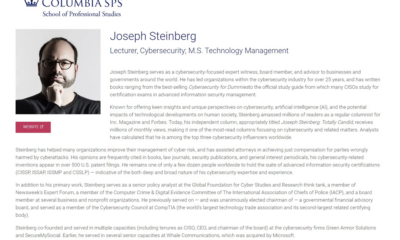Want a Well Paying & Great Career: Study Cybersecurity
Thinking about choosing a college major or about making a career choice? Wondering what to do after high school? Not sure what jobs will be around and pay well as technology continues to replace humans in so many areas of the workforce?
Check out the amazing field of cybersecurity…
1. Cybersecurity can help you earn a high salary.
Cybersecurity professionals are usually well paid. Technology workers in general typically earn higher than average salaries when compared with their peers in most other professions, and people who specialize in cybersecurity are often among the most highly compensated of technology workers.
According to the United States Department of Labor, the median annual wages for information security analysts is about $100,000 nationally, with many jobs paying considerably higher wages, especially in expensive, competitive job markets. In the New York area, for example, the mean salary as of May 2019 was over $127,000! Even many entry-level jobs in the cybersecurity field pay quite well.
2. Salaries for cybersecurity workers are likely to continue to rise.
For years, the demand for cybersecurity professionals has outpaced the supply of qualified personnel – and that situation is not expected to change in the foreseeable future (even if it is potentially disrupted temporarily by the COVID-19 pandemic) – creating a situation in which salaries are likely to continue to rise with time. Investing in cybersecurity training now can pay off quite handsomely in the future.
3. Cybersecurity may offer you better job security than you would find elsewhere.
Compared with other private sector, at-will jobs – especially in non-revenue producing roles – many cybersecurity positions offer relatively strong job security. Businesses know that replacing cybersecurity professionals can be time consuming and expensive. And if the wrong person is hired, or a mistake happens as a result of an imperfect knowledge-transfer process, it can be downright dangerous. Executives understand that reducing resources dedicated to information security can increase the risk of a data breach, and that if a firm shrinks its cybersecurity budget, or lets cybersecurity staff go, and then suffers a breach, its leadership may face the wrath of customers, investors, and government regulators.
Of course, there are no guarantees. Pandemic-related shutdowns have certainly caused some cybersecurity workers to lose their jobs. Yet, while the pandemic specifically and recessions in general surely impact the cybersecurity sector, job losses in the cybersecurity world often pale when compared with the losses in other sectors. Executives responsible for keeping businesses safe know that cyberattacks do not stop during economic downturns, and attackers are more likely to strike – not less likely – while businesses are operating using skeleton crews of remote workers.
4. The cybersecurity field has an effectively no long-term unemployment.
For several years prior to the COVID-19 pandemic, it was difficult – if not impossible – to find a qualified cybersecurity professional who was seriously seeking employment for months on end yet unable to find work. Studies showed that there was a tremendous shortage of qualified cybersecurity professionals, creating a situation in which potentially over one million cybersecurity job openings were unfilled on the eve of the pandemic. In fact, several years ago, the United States Bureau of Labor Statistics predicted that “employment of information security analysts is projected to grow 28 percent from 2016 to 2026, much faster than the average for all occupations.”
At this point in time, as COVID-19 still ravages around us, it is impossible to quantify the total impact of the current pandemic upon the cybersecurity profession. Yet, we can be confident that, whatever else it might do, the pandemic is not going to suddenly create a million qualified cybersecurity professionals, nor is it likely to change the long-term trajectory for the field. And, eventually, when the pandemic ends – which it will – the shortage of skilled manpower that began several years ago is likely to re-emerge, creating a challenge for those seeking to hire cybersecurity professionals, and another opportunity for skilled workers who can fill such jobs. Of course, even before COVID-19 is relegated to history books, successfully finding a job working in cybersecurity is probably a lot easier to accomplish than is seeking employment in many other fields.
5. Cybersecurity jobs exist all over the country (and the world).
While many professions are either officially or effectively disproportionately tied to specific regions of the country or of the world, cybersecurity professionals enjoy great flexibility as to where they can live. Some cybersecurity positions even allow people to work remotely on a full time basis, even in the absence of pandemics and/or other emergencies.
6. There are many different types of cybersecurity jobs.
There are many different types of cybersecurity-related jobs, and professionals can pursue areas that they especially enjoy. Typically, bachelors programs in cybersecurity expose students to knowledge and skills utilized in multiple areas of the field.
7. Cybersecurity is exciting.
Cybersecurity is one of the few professions in which professionals get to experience rapid change, utilize the latest in technology, see the creativity and wisdom of highly-sophisticated adversaries, and participate in the constant battle between good and evil.
8. By working in cybersecurity, you can help make the world be a better place.
At its core, the work that most cybersecurity professionals perform is ultimately intended to improve the world, by protecting innocent and honest people and organizations from outsiders seeking to inflict harm.
Of course, one of the reasons that working in cybersecurity can be rewarding is because cybersecurity is demanding. Prospective professionals need to acquire significant relevant knowledge and skills. So, if you are interested in looking into cybersecurity as a possible career choice, I suggest that you read up on the field and explore relevant educational and training opportunities.
This article is sponsored by Utica College. Learn more about Utica’s accredited online Bachelor of Science in Cybersecurity degree program or their full suite of online cybersecurity degrees.













 CyberSecurity for Dummies is now available at special discounted pricing on Amazon.
Give the gift of cybersecurity to a loved one.
CyberSecurity for Dummies is now available at special discounted pricing on Amazon.
Give the gift of cybersecurity to a loved one.